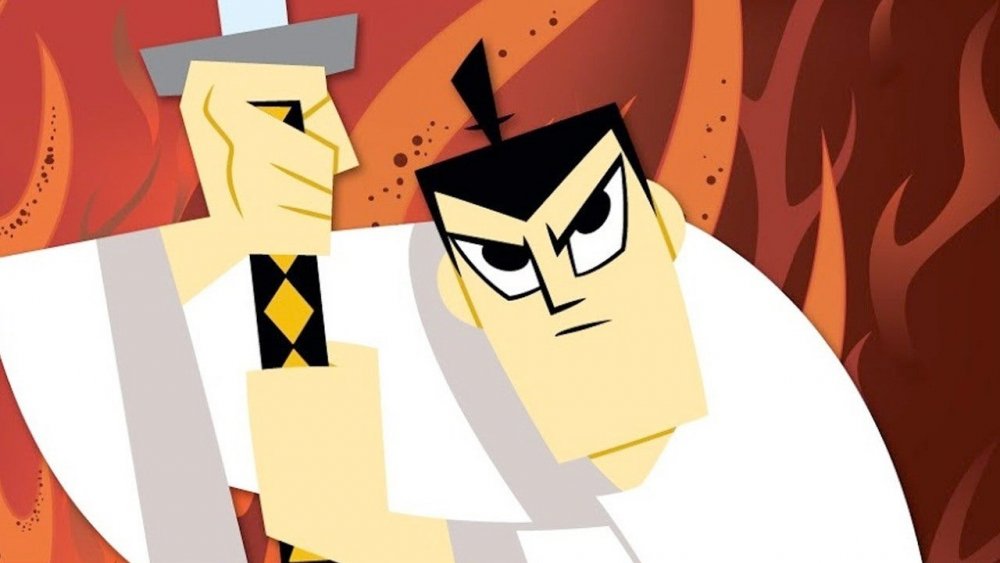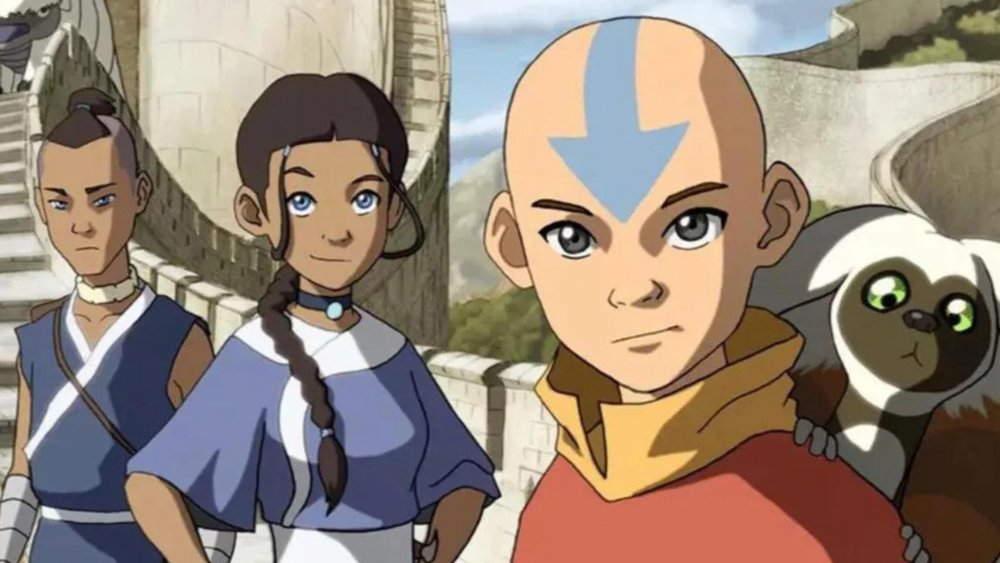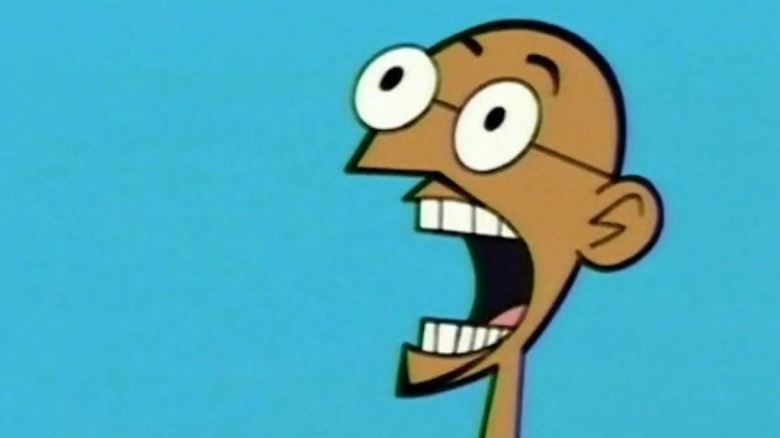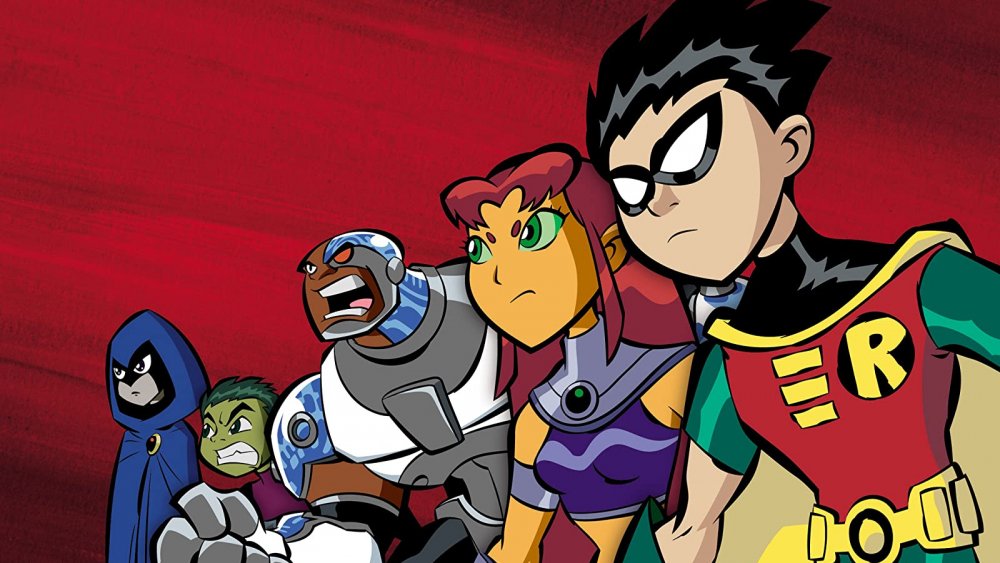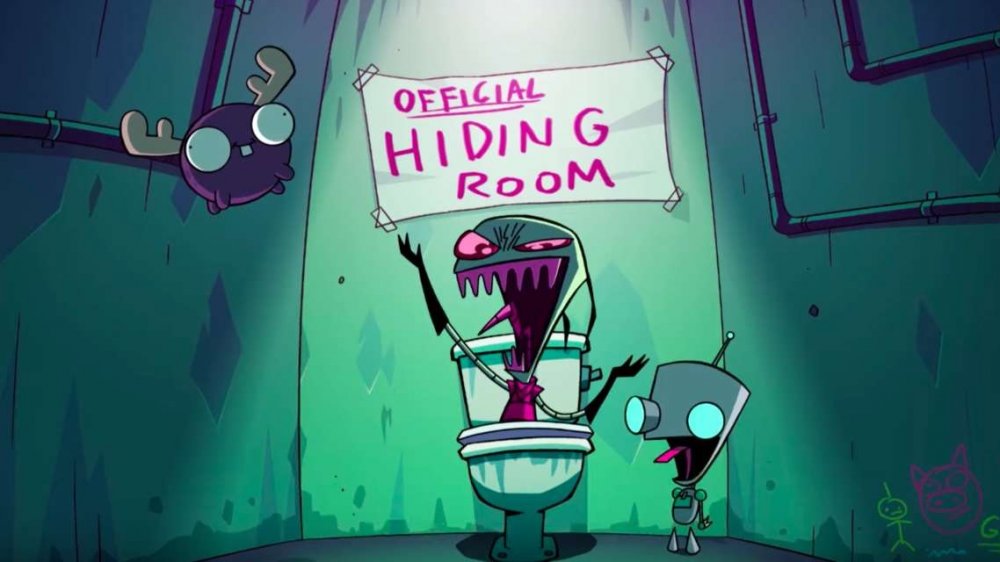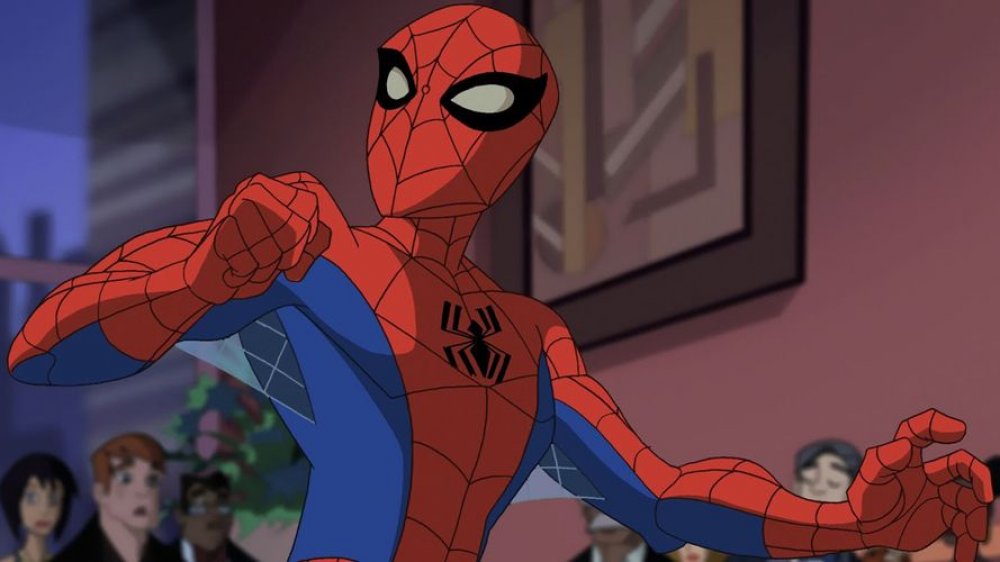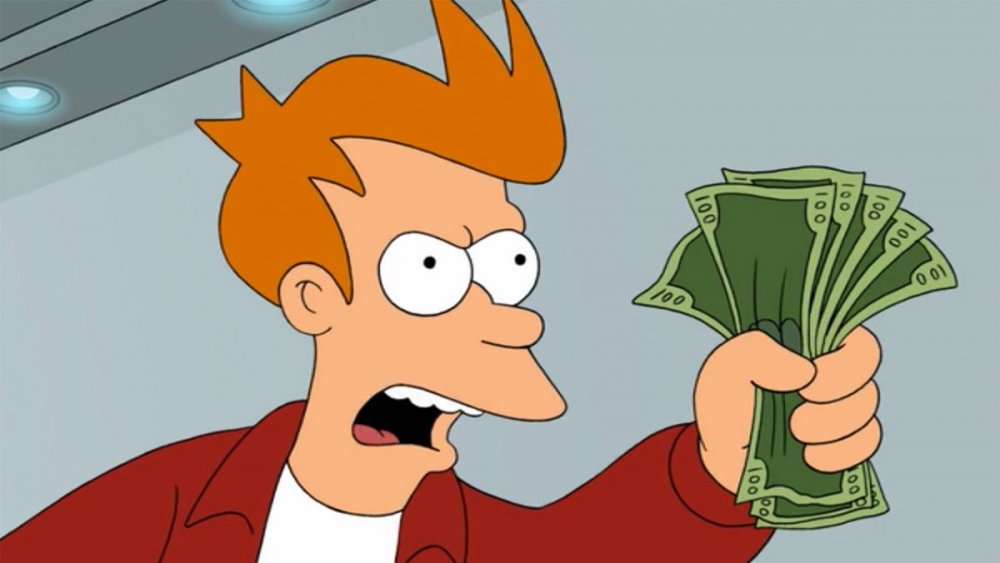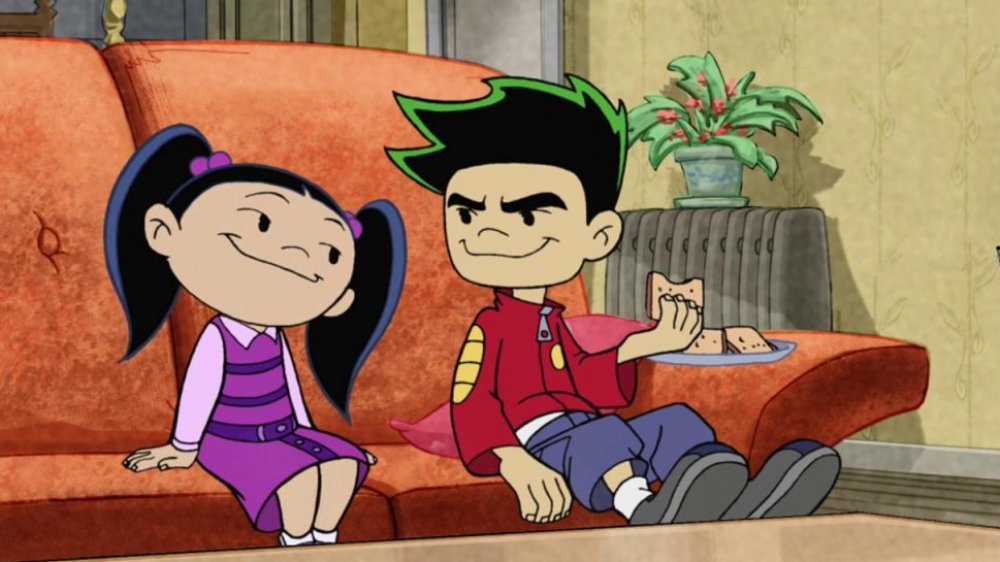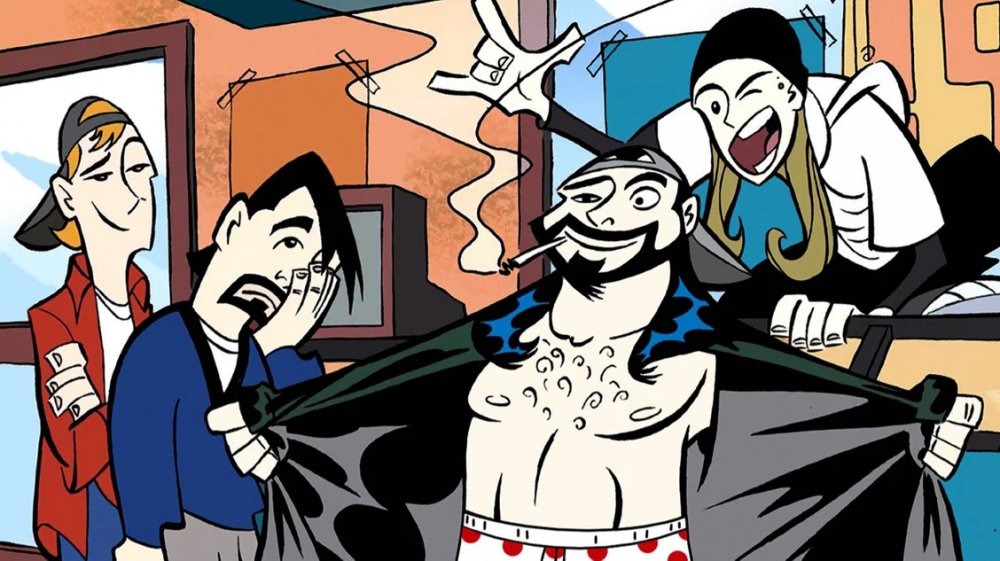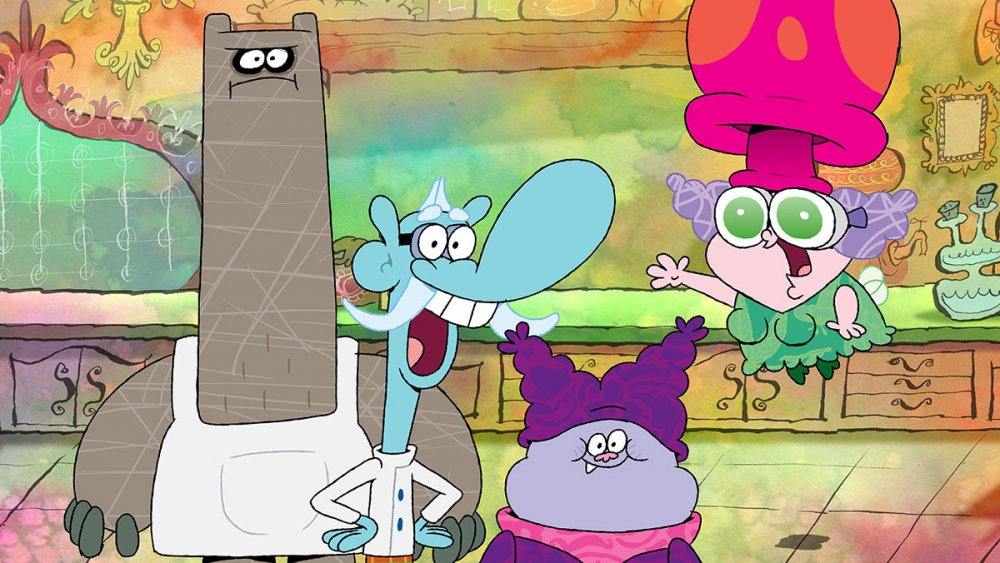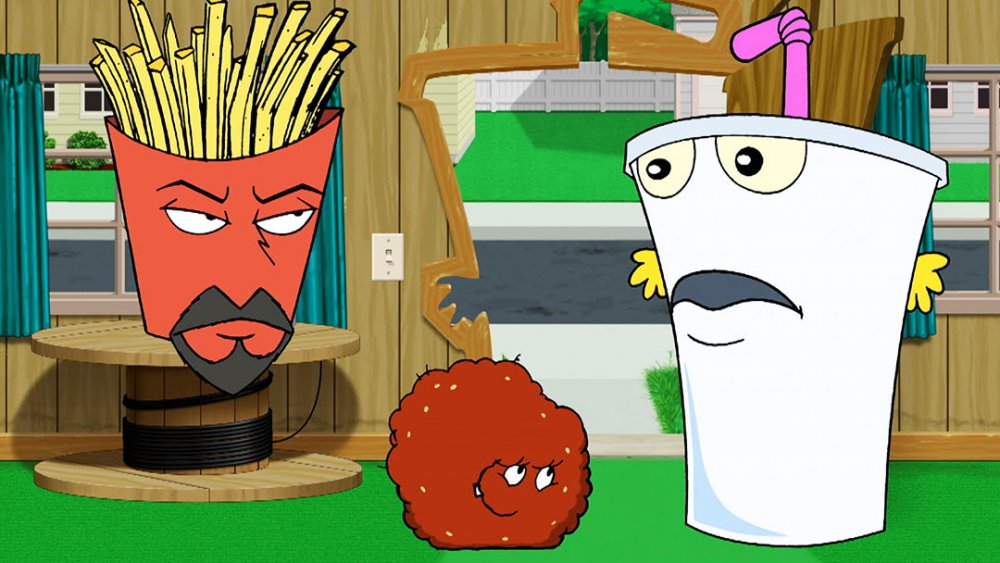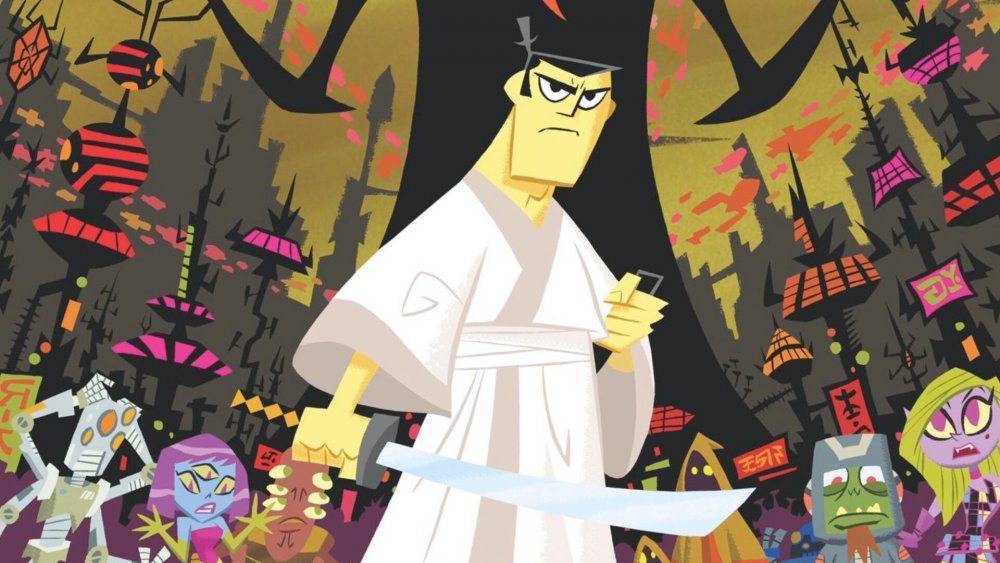The Real Reason These '00s Cartoons Were Canceled
The '00s was a time of great change for animated TV shows. The Saturday morning cartoon had been an American institution since the 1960s, but when Congress passed the Children's Television Act in the '90s — forcing the networks to dedicate more time to educational shows and limiting the amount of advertising aimed at kids — the landscape began to shift. By the mid-point of the decade, most Americans had cable TV in their homes, giving them access to channels dedicated entirely to cartoons. High-speed broadband came next, which fed the flame of both YouTube and Netflix. Before long, fans had their favorite animated shows at their fingertips 24/7, and the Saturday morning cartoon was dead and buried.
Increased demand for content led to more shows getting greenlit during the 2000s, but it also encouraged a culture of impatience. Networks were tripping over each other to land the next big hit, and when the results weren't instantaneous, they often pulled the plug and moved on, fans' feelings be damned. This led to some of the most memorable cartoons of the time getting axed way too early, sometimes for inexplicable reasons. From cult Cartoon Network hits and old Nickelodeon favorites to beloved superhero shows and bizarre feature film spin-offs, here's why these '00s cartoons were canceled.
Avatar: The Last Airbender was canceled thanks to the movie
One of the biggest cartoons of the '00s, Nickelodeon's Avatar: The Last Airbender spawned several comics and manga spin-offs (the show deftly blended typical American animation with an anime style), as well as a sequel series that's still detested by the majority of fans to this day. (Netflix had to come out and publicly defend The Legend of Korra on Twitter when it debuted on the streaming service in 2020 with the original three seasons.) And the mood among ATLA fans has been pretty foul since April 2019, when the show's former head writer finally revealed why Nickelodeon pulled the plug.
In 2010, a live-action adaptation of Avatar: The Last Airbender hit cineplexes and bombed spectacularly. M. Night Shyamalan's film "squanders its popular source material with incomprehensible plotting, horrible acting, and detached joyless direction" according to Rotten Tomatoes, where The Last Airbender has a devastating critics' score of just 5 percent. The worst thing about it is that Nickelodeon reportedly only axed the cartoon because Shyamalan showed an interest in making a feature film. "Truthfully, there was a moment in time when we all thought we would do a fourth season of Avatar: The Last Airbender," writer Aaron Ehasz tweeted in 2019. "Then along came M. Night..."
Shyamalan defended his movie during an interview with IGN, reminding everyone that he made it for kids. "You could make it for that same audience," he said, "which is what I did — for nine- and ten-year-olds — or you could do the Transformers version and have Megan Fox." Or you could've gone with the third option and made it, you know, a good movie.
Clone High offended an entire country
Long before Phil Lord and Chris Miller spearheaded Hollywood franchises, they created a cartoon that launched their careers and got a lot of attention overseas. Clone High, which followed teenage clones of historical figures as they navigated high school together, debuted in 2002, but it was pulled the following year after just a single 13-episode season. MTV didn't cancel the show due to low ratings or poor critical reception (it got a lukewarm response at the time and is now considered a bona fide cult classic). Instead, the network was forced to act after a massive outcry over the portrayal of Mahatma Gandhi — or Gandhi's clone, as it were.
Lord and Miller portrayed Gandhi as particularly hormonal, and it didn't go over well in India. The show never aired there, but when people caught wind of what Clone High had done to one of their national treasures, there were hunger strikes and calls to have MTV's licence to broadcast in India revoked. "I was like, 'Wow, I guess any publicity is good publicity?'" Miller told Entertainment Weekly. "Instead [MTV was] like, 'Oh no, we're taking it off the air and scrubbing its existence from all of our websites and materials.' I guess not all publicity is good publicity, as it turns out. It was a really crazy story, but they didn't want us to talk about it at all. We were sort of gagged about it for years." A revival for Max was similarly short-lived.
Teen Titans was canceled for mysterious reasons
Teen Titans Go! has grown into the jewel in the Cartoon Network crown since it started airing in 2013, but there's a certain section of the DC fandom that can't stand the show — namely, fans of the original Teen Titans. The first animated iteration of the teenage superhero team debuted in 2003, and their adventures were initially scheduled to last for a total of four seasons. The show's popularity led to a fifth season, and the way that ended (Beast Boy's love interest, Terra, showed up in the finale, apparently suffering from a bout of amnesia) made it seem as though a sixth was definitely in the pipeline, but it never materialized.
Viewers began to panic when a source close to the show told Titans Tower that the chances of getting a sixth season were "very, very, very dim." The blog attempted to mobilize fans, but their protests were in vain — Cartoon Network axed the superhero series in 2006 after 65 episodes and a TV movie. There's been plenty of rumors about why it was canceled in the years since, with some blaming Cartoon Network and others pointing the finger at Warner Bros. Animation, who created the show. David Slack, a former producer on Teen Titans, said that he's "heard different answers" from different people in a 2017 tweet. Some have told him that the ratings fell because the "Trigon season" was "too scary" for its target audience, while others say that "Mattel wanted it dead because Bandai had [the] toy deal."
How Invader Zim was conquered and kicked off the air
Invader Zim is regularly ranked among Nickelodeon's best shows, despite the fact that it didn't even make it to the end of its second season. Created by writer and cartoonist Jhonen Vasquez, the show (which followed the titular alien as he failed miserably at conquering Earth) was pulled after just 27 episodes. A Christmas special aired in December 2002, then Zim disappeared (the remaining, unseen season 2 episodes were eventually shown in 2006). So why did Zim call off the invasion? Some some say that execs were unhappy about the blink-and-you'll-miss-it bloody GIR Easter egg that animators were repeatedly slipping into single frames of the show, but according to Vasquez, it was a mixture of things.
"In the end, even I couldn't give you the whole and accurate truth for why the show got pulled," the creator wrote in a 2010 blog post. "The most likely culprits are simply ratings and the sheer expense of the show, which was monstrously expensive at the time." According to Richard Horvitz, who voiced the eponymous extraterrestrial, world events likely played a big part in Invader Zim's demise. "The show premiered in March of 2001 — by September of 2001, we had the horrible downing of the Twin Towers," he told SyFy. "At that time, given the mood of the country at the time, I don't think people wanted to see shows that were about any kind of destruction or anything that had to do with someone trying to conquer the Earth."
The Spectacular Spider-Man was canceled over TV rights
The 1990s animated Spider-Man series is often considered the best of all the web-slinger's cartoons, but for Gen Z kids, it's all about The Spectacular Spider-Man. The show, which debuted in March 2008 and lasted until November 2009, made some great choices when it came to villains and did a fantastic job with the often overlooked Gwen Stacy. Fans and critics reacted well to the series, so why did Sony stop making it? In short, the studio gave up its Spider-Man TV rights, which returned fully to Marvel. Instead of continuing with the popular The Spectacular Spider-Man, Marvel decided to wipe the slate clean and start over with a brand new Spidey show, Ultimate Spider-Man.
According to The Spectacular Spider-Man's supervising producer and story editor, Greg Weisman, nobody at Marvel contacted him about continuing the show after the rights switch, which he took as a sign. "I've heard nothing directly from Marvel, but I think the Ultimate Spider-Man announcement makes it fairly clear that Spectacular is over," he said after IGN reached out for an update. Hobgoblin and Scorpion were among the villains that Weisman planned to include in the unmade third season of the show. He initially wanted to do five seasons of Spectacular in total. "Then we'd follow up the series with a series of movies covering his college years," he said in a 2013 blog post. "Of course, none of this was to be."
There was a lot of drama with Futurama
The Simpsons was never going to be an easy act to follow, but Matt Groening thinks he did a pretty good job with Futurama. The animated sci-fi sitcom debuted in 1999 and got off to a rocky start. Groening wanted Futurama to air directly after The Simpsons on a Sunday evening, but Fox only kept it there for two episodes before shifting the show to a Tuesday. It was moved back to its original slot for season 2, but it didn't stay there long — Fox chose to shift Futurama to 7:00 PM on a Sunday, hurting its chances further. The way Groening tells it, the network had it in for his new show right from the start.
"The people at Fox didn't ever support the show, and it wasn't to their taste, and in my opinion, they're out of their minds," he told Chortle in 2003. "But they don't like The Simpsons, either. The idea of a TV show that they haven't gotten their greasy fingers all over creatively drives them nuts. That's why almost everything else is so lousy. ... We won the Emmy for best animated show, and I didn't even get a begrudging phone call from anyone at Fox. That's a dark company that they can't even make a fake phone call." Fortunately, Groening got the chance to continue Philip J. Fry's story when Futurama was picked up by Comedy Central in 2008. It ran until 2013, when it was canceled again — but then in 2022, plans were announced for another series revival, this time courtesy of Hulu.
Disney said so long to American Dragon: Jake Long
It's never been the most well-known Disney Channel cartoon, but American Dragon: Jake Long (a New York-set Romeo & Juliet story about a boy who transforms into a dragon and a girl who hunts them) was reportedly pretty popular with viewers during its two-year run. According to creator Jeff Goode, it was "the number one or number two animated show on the Disney Channel" at the time, and it fared "even better in some of the international markets." Jake Long even showed up in an episode of Lilo & Stitch: The Series, seemingly indicating that the Mouse House saw the character as a keeper. That wasn't the case, however — American Dragon: Jake Long was canceled after two seasons in 2007.
So what went wrong, exactly? Well, it seems the damage was done when the powers that be decided to change the animation style. "The second season had a different director, and we decided to take the opportunity to try some things with the art that we didn't get a chance to do in the first season," Goode said in an interview shared by a fan site set up to save the show. Efforts to get a third season greenlit were ultimately unsuccessful. "We're not certain we understand the Channel's reasons behind the cancellation, but we certainly respect their decision," co-developer Eddie Guzelian wrote on the AmDrag blog (via AnimeSuperhero). "We are, however, pretty disappointed. We would've loved to have done more episodes."
Disney wasn't crazy about Clerks: The Animated Series
Kevin Smith operates on the fringes of Hollywood nowadays, but at the turn of the millennium, he held some real sway. The New Jersey native burst onto the scene with slacker comedy Clerks in 1994 and quickly established himself as the new voice of Gen X with 1995's Mallrats and 1997's Chasing Amy. He jumped from indie filmmaker to Hollywood director with 1999's Dogma, but his next project proved to be the first in a series of missteps. Smith hyped up Clerks: The Animated Series ahead of its premiere in May 2000 ("The first episode is guaranteed to have the biggest audience of anything we've ever done," he said), but to call it a short-lived series would be an understatement — ABC yanked it just two episodes into the six-episode order.
So what happened? Well, according to the Pittsburgh Post-Gazette, when ABC picked up Clerks, it was in third place as a network, and it was willing to take chances on Smith's bizarre project. However, a couple of factors came into play that tanked the future of the show. Firstly, the head honchos at Disney weren't crazy about the series, which in turn affected ABC's opinion on the show. Secondly, Who Wants to Be a Millionaire? came along and brought a massive audience over to the channel, and as Smith himself put it, "Before, nothing was working. Now, they don't need risky and risque projects like ours."
And that's when bad stuff started happening to Clerks. Its premiere was moved from March to May, and worse still, according to Smith (who's expressed interest in a revival), ABC set the show up to fail by showing the episodes out of order.
Chowder didn't fit Cartoon Nework's vision
A wonderfully weird show that aired for three seasons during the twilight of the '00s, C.H. Greenblatt's Chowder won a Primetime Emmy and was nominated for six Annie Awards during its run. The Cartoon Network series, which followed the eponymous character's mishaps as a trainee under master chef Mung Daal, debuted in 2007, but Greenblatt had been working on it for several years by that stage. "I think it was probably a concept that I was doodling back when I was working on SpongeBob," he told Toon Zone (via AnimeSuperhero). "I was just kind of filling sketchbooks full of ideas, so probably the late '90s, beginning of 2000."
Chowder's cancellation wasn't related to its performance. It was simply the victim of a change in strategy. In an effort to compete with Nickelodeon and Disney's live-action content, Cartoon Network introduced a new block called CN Real, debuting a bunch of kid-friendly reality shows. Execs had a risky new vision for the channel, and Chowder wasn't part of it. "The show didn't fit with their new, older boys demographic (Remember Destroy, Build, Destroy?)," Greenblatt said on Tumblr. So, he used the free time to plan a vacation to Japan. "I didn't really think there'd be this many upsides to having a show officially cancelled by a network, but I'm feeling happier than I've been in a long time," Greenblatt said via his Nerd Armada blog.
Aqua Teen Hunger Force was canceled thanks to 'odd behavior'
Nothing encapsulates the irreverence of '00s late-night cartoons quite like Aqua Teen Hunger Force. The long-time king of Cartoon Network's Adult Swim block, Dave Willis and Matt Maiellaro's show about three living food items (French fry order Frylock, milkshake Master Shake, and dim-witted meatball Meatwad) sharing a run-down place in New Jersey began as a spin-off of Space Ghost Coast to Coast. However, it would soon surpass the parody talk show in terms of popularity. Aqua Teen Hunger Force debuted in 2000 and would go on to dominate for a decade and then some, running until 2015. And when Maiellaro and Willis sat down with Vice days after the first episode of the final season premiered, the co-creators took aim the network.
"It's actually quite shocking and a bummer at the same time," Maiellaro said. "The show does well, it generates a lot of revenue, it's not too expensive to make. So for them to let it go is just a bit odd. We call it odd behavior." The pair doubled down on these claims during an interview with WABE a few weeks later. According to Willis, the show (which was renamed Aqua Teen Hunger Force Forever for its closing season) was axed because "Adult Swim doesn't like money." Both men were adamant that the show was still generating plenty of cash. "They got tired of the trucks pulling up and dumping it on the loading dock," Maiellaro added. "It wasn't our decision." Surprisingly, a twelfth season was commissioned for 2023.
Samurai Jack finally got its ending ... over a decade later
After creating Dexter's Laboratory for Cartoon Network, Genndy Tartakovsky became one of the company's biggest assets. Execs put him to work on The Powerpuff Girls when he ended the series in 1998, but it wasn't long before Tartakovsky came to them with another original idea, one less about the laughs and more about action. "I would complain about all other animated action shows, and so I decided that maybe I gotta walk the walk," he told IndieWire. "I pitched it as, 'It's a samurai, who gets transplanted into the future, he walks around and fights robots with his sword, and there's not a lot of dialogue, and it's super stylized,' and then we went for it."
Samurai Jack debuted in 2001 and quickly gained a cult following, but it came to an abrupt end in 2004, with no conclusion offered. Did Cartoon Network lose interest in Jack's journey, or was Tartakovsky the one that decided to call it quits? The truth is, it was mutual. "At the end of the fourth season, we were all burnt out," the creator told The Verge. "The network didn't know what they wanted to do, I didn't know what I wanted to do." So Tartakovsky decided to "quietly finish" the series at four seasons when he was offered the chance to spearhead Star Wars: Clone Wars, but luckily for him — and Samurai Jack fans the world over — he got the chance to wrap the story up with a mini-series in 2017.
